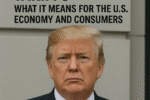James Comey Indicted: A New Chapter in Trump’s Political Crusade?
Introduction
In a move that has sent shockwaves across the American political landscape, former FBI Director James Comey has been indicted on charges of making false statements and obstruction of a congressional proceeding. This development comes amidst what many are calling a politically charged campaign by former President Donald Trump to settle old scores with his adversaries.
But what does this indictment mean for the rule of law, American democracy, and the future of political accountability?
Let’s break it down.
Who Is James Comey?
James Comey served as the Director of the FBI from 2013 to 2017. Appointed by President Barack Obama, Comey played a central role in two politically sensitive investigations:
- The probe into Hillary Clinton’s use of a private email server.
- The Russia investigation, which examined potential ties between the Trump campaign and Russian operatives.
Comey was fired by Donald Trump in May 2017, a decision that sparked widespread controversy and eventually led to the appointment of Special Counsel Robert Mueller.
Details of the Indictment
Filed in a federal court in Alexandria, Virginia, the indictment accuses Comey of:
- Making false statements during a 2020 congressional testimony.
- Obstructing a congressional proceeding, specifically regarding claims about FBI leaks related to the Trump and Clinton investigations.
The charges stem from Comey’s testimony in which he stated he never authorized FBI agents to speak to the media about ongoing investigations. Prosecutors now allege that this statement was false and materially misleading.
Key Takeaway:
The charges are narrow but serious, and they could carry significant political and legal consequences if proven.
Political Context: Trump’s “Retribution” Agenda
This indictment doesn’t exist in a vacuum. Since returning to political prominence, Donald Trump has openly vowed to hold his “enemies” accountable—many of whom were central figures in the investigations and controversies of his first term.
Comey’s name has frequently appeared on Trump’s hit list, often used in rallies, interviews, and campaign ads to symbolize the so-called “deep state” opposition.
Critics argue that this indictment is part of a wider strategy to weaponize the Department of Justice against political opponents. Supporters, however, claim it’s long-overdue accountability.
What Legal Experts Are Saying
Legal scholars are split. Some believe the charges, while limited, set a dangerous precedent that could be exploited for political gain in the future.
Others argue that no one should be immune from prosecution, especially those who once held positions of immense power.
Considerations from the legal community:
- The timing of the indictment—just months before the next presidential election.
- The possible chilling effect on future testimony by public officials.
- The broader implications for DOJ independence.
Public Reaction: Divided as Ever
In typical fashion, the public response has largely mirrored existing political divides:
- Conservative circles have cheered the indictment as a long-overdue reckoning.
- Liberal and moderate voices have raised concerns about selective justice and erosion of democratic norms.
Social media is buzzing with conspiracy theories, support campaigns, and deep skepticism—yet another reminder of the polarized environment surrounding U.S. politics today.
What’s Next for Comey?
Comey’s legal team has issued a brief statement, denying any wrongdoing and signaling a strong defense. Legal proceedings are expected to unfold over the next several months, potentially overlapping with the 2026 election cycle.
If convicted, the former FBI director could face:
- Fines,
- Potential prison time,
- And long-term damage to his reputation and legacy.
The Bigger Picture: Democracy at a Crossroads
Whether you view Comey’s indictment as justified legal action or political retaliation, one thing is clear: American institutions are being tested. The outcome of this case could set the tone for how future administrations treat former officials and political adversaries.
Key Questions Moving Forward:
- Is the justice system being used as a political tool?
- Will this trigger more indictments against other former officials?
- Can American democracy survive the cycle of political revenge?
Final Thoughts
James Comey’s indictment is more than a legal headline—it’s a symbol of a deeply divided nation grappling with questions of truth, justice, and power. As the case unfolds, it will undoubtedly serve as a litmus test for the strength of American democratic institutions and the rule of law.
Stay informed, stay critical, and above all, stay engaged.













